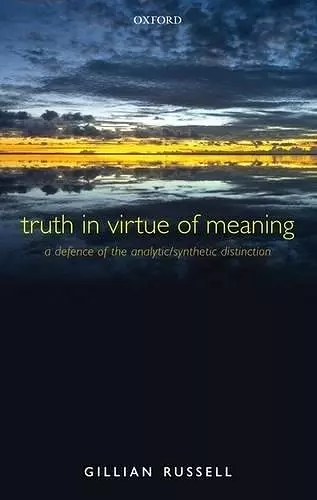Truth in Virtue of Meaning
A Defence of the Analytic/Synthetic Distinction
Format:Hardback
Publisher:Oxford University Press
Published:28th Feb '08
Currently unavailable, and unfortunately no date known when it will be back
This hardback is available in another edition too:
- Paperback£42.99(9780199694730)

The analytic/synthetic distinction looks simple. It is a distinction between two different kinds of sentence. Synthetic sentences are true in part because of the way the world is, and in part because of what they mean. Analytic sentences - like all bachelors are unmarried and triangles have three sides - are different. They are true in virtue of meaning, so no matter what the world is like, as long as the sentence means what it does, it will be true. This distinction seems powerful because analytic sentences seem to be knowable in a special way. One can know that all bachelors are unmarried, for example, just by thinking about what it means. But many twentieth-century philosophers, with Quine in the lead, argued that there were no analytic sentences, that the idea of analyticity didn't even make sense, and that the analytic/synthetic distinction was therefore an illusion. Others couldn't see how there could fail to be a distinction, however ingenious the arguments of Quine and his supporters. But since the heyday of the debate, things have changed in the philosophy of language. Tools have been refined, confusions cleared up, and most significantly, many philosophers now accept a view of language - semantic externalism - on which it is possible to see how the distinction could fail. One might be tempted to think that ultimately the distinction has fallen for reasons other than those proposed in the original debate. In Truth in Virtue of Meaning, Gillian Russell argues that it hasn't. Using the tools of contemporary philosophy of language, she outlines a view of analytic sentences which is compatible with semantic externalism and defends that view against the old Quinean arguments. She then goes on to draw out the surprising epistemological consequences of her approach.
Russell's book is impressive and richly argued... she has brought the debate on analyticity to a new level. In her book she presents us with an alternative, well-developed and highly original way of thinking about truth in virtue of meaning, one that cirumvents many of the difficulties that plague traditional analyticity. This makes the book a must-read by anybody interested in the topic of analyticity, and the nature of meaning generally. * Åsa Wikforss, Notre Dame Philosophical Reviews *
This is an excellent book which, in my opinion, ought to be read by any philosopher whose work is focused on analyticity, and which will be of considerable interest to those interested in contemporary philosophy of language more generally ... Stylistically the book is a delight ... This deserves to eb an influential book, and I am confident it will spark a new trend in debated about analyticity. * C. S. Jenkins, Mind *
ISBN: 9780199232192
Dimensions: 223mm x 145mm x 20mm
Weight: 443g
256 pages